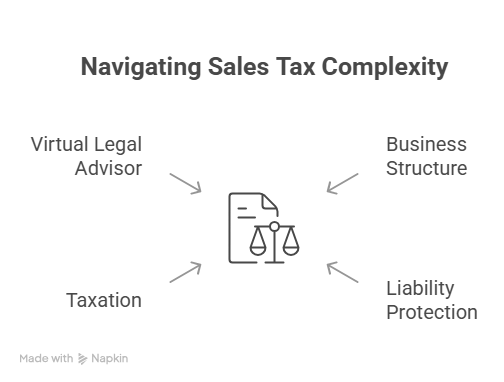Navigating the complexities of running a successful online venture requires more than just a great product or service. It demands a thorough understanding of the legal landscape that governs digital entrepreneurship.
Did you know that a significant number of online businesses fail due to non-compliance with regulatory requirements? This oversight can lead to severe penalties, damaging your reputation and bottom line.
Seeking professional legal guidance can help you avoid these pitfalls, ensuring your online business operates within the bounds of the law. This guide will walk you through the essential legal considerations for your online venture, providing you with the knowledge to succeed.
Essential Legal Requirements for Online Businesses
Running a successful online business requires more than just a great product or service; it also demands a solid understanding of the legal requirements that govern e-commerce. As the digital landscape continues to evolve, entrepreneurs must stay informed about the various laws and regulations that impact their operations.
Business Structure and Registration
Choosing the right business structure is a critical decision for online entrepreneurs. The most common options include Limited Liability Companies (LLCs), Corporations, and Sole Proprietorships.
Choosing Between LLC, Corporation, or Sole Proprietorship
Each business structure has its advantages and disadvantages. For instance, an LLC offers liability protection and flexibility in taxation, while a Corporation is often preferred for larger businesses due to its ability to issue stock. A Sole Proprietorship is the simplest structure but offers no liability protection.
Licenses and Permits for E-Commerce
Online businesses must comply with various licensing and permitting requirements, which can vary significantly by state and locality.
State-Specific Requirements for Online Sellers
It’s crucial for e-commerce businesses to research and understand the specific licenses and permits required for their operations. This may include sales tax permits, business licenses, and other local permits.
Tax Obligations for Digital Entrepreneurs
Understanding tax obligations is vital for online businesses, particularly in the context of sales tax collection across state lines.
Sales Tax Collection Across State Lines
The complexity of sales tax laws requires online businesses to stay informed about their obligations in different states. A virtual legal advisor can provide valuable guidance on navigating these regulations.
| Business Structure | Liability Protection | Taxation |
|---|---|---|
| LLC | Yes | Flexible |
| Corporation | Yes | Double Taxation |
| Sole Proprietorship | No | Personal Income Tax |

By understanding and complying with these essential legal requirements, online businesses can minimize risks and focus on growth and success. Seeking digital law consultations can provide entrepreneurs with the necessary insights to navigate the complex legal landscape.
When to Seek Online Business Legal Consultation
As an online business owner, navigating the complex legal landscape can be daunting, making it crucial to know when to seek professional legal counsel. The legal aspects of running an online business are multifaceted, involving various areas such as intellectual property protection, website policies, and data privacy regulations.
Protecting Your Intellectual Property
Safeguarding your intellectual property (IP) is vital for maintaining a competitive edge in the digital marketplace. This includes securing trademarks for your brand identity, copyrights for original content, and patents for innovative products or processes.
Trademarks, Copyrights, and Patents for Digital Assets
Understanding the different types of IP protection is essential. For instance, trademarks help distinguish your brand, while copyrights protect original works. Patents, on the other hand, are crucial for safeguarding inventions.
Creating Compliant Website Policies
Having compliant website policies is not just a legal necessity; it also fosters trust with your customers. Key policies include Terms of Service and Privacy Policy, which must comply with regulations like the General Data Protection Regulation (GDPR).
Terms of Service, Privacy Policy, and GDPR Compliance
Your Terms of Service outline the rules for using your website, while your Privacy Policy explains how you handle user data. Ensuring these policies are GDPR compliant is critical if you serve customers in the EU.
Navigating Data Privacy Regulations
Data privacy laws are becoming increasingly stringent, with regulations like the California Consumer Privacy Act (CCPA) and GDPR setting the standard. Compliance requires a thorough understanding of how to handle consumer data responsibly.
CCPA, GDPR, and Emerging Privacy Laws
Staying ahead of data privacy regulations involves not just complying with current laws but also anticipating future changes. This proactive approach helps protect your business from legal repercussions.
Protecting Your Online Business with Professional Legal Guidance
Navigating the complex legal landscape is crucial for the success of any online business. As discussed, understanding and complying with essential legal requirements, such as business structure and registration, licenses, and tax obligations, is vital.
Seeking online business legal consultation can provide valuable insights into protecting your intellectual property, creating compliant website policies, and adhering to data privacy regulations. Utilizing web-based legal services can streamline this process, ensuring your business remains compliant and secure.
By prioritizing legal compliance and seeking professional advice when needed, digital entrepreneurs can safeguard their business interests and focus on growth. This proactive approach to legal matters not only mitigates risks but also fosters a trustworthy and reliable online business environment.
FAQ
What are the essential legal requirements for starting an online business?
The essential legal requirements include choosing a business structure, registering your business, obtaining necessary licenses and permits, and understanding tax obligations. It’s also crucial to comply with data privacy regulations and protect your intellectual property.
How do I choose the right business structure for my online business?
Choosing the right business structure depends on several factors, including your business goals, liability concerns, and tax implications. You can consider structures like LLC, Corporation, or Sole Proprietorship, and consult with a virtual legal advisor to determine the best fit for your online business.
What licenses and permits do I need for my e-commerce business?
The licenses and permits required for your e-commerce business vary depending on your location, business type, and products sold. You may need state-specific licenses, sales tax permits, and other local permits. A web-based legal service can help you navigate these requirements.
How do I comply with data privacy regulations like GDPR and CCPA?
To comply with data privacy regulations, you need to understand the specific requirements for your business, such as implementing a privacy policy, obtaining user consent, and ensuring data security. A digital law consultation can provide guidance on navigating these complex regulations.
Why is it important to protect my intellectual property as an online business?
Protecting your intellectual property is crucial to prevent unauthorized use, maintain brand identity, and ensure competitive advantage. You can protect your IP through trademarks, copyrights, and patents, and seek online legal guidance to understand the best strategies for your business.
When should I seek online business legal consultation?
You should seek online business legal consultation when you’re unsure about legal requirements, need help with compliance, or want to protect your business interests. A remote legal counsel can provide timely advice and help you make informed decisions.
How can I ensure my website policies are compliant with relevant laws?
To ensure compliant website policies, you need to stay up-to-date with changing laws and regulations, such as GDPR and CCPA. A virtual legal advisor can help you review and update your terms of service, privacy policy, and other policies to ensure compliance.
What are the implications of not complying with sales tax regulations across state lines?
Non-compliance with sales tax regulations can result in penalties, fines, and reputational damage. An e-commerce legal assistance service can help you understand your sales tax obligations and ensure you’re collecting and remitting sales tax correctly across different states.
How can I stay informed about emerging privacy laws and regulations?
To stay informed, you can follow reputable sources, attend industry events, and consult with a digital law expert who can provide guidance on emerging trends and regulations, such as changes to CCPA or new laws like the Virginia Consumer Data Protection Act.

